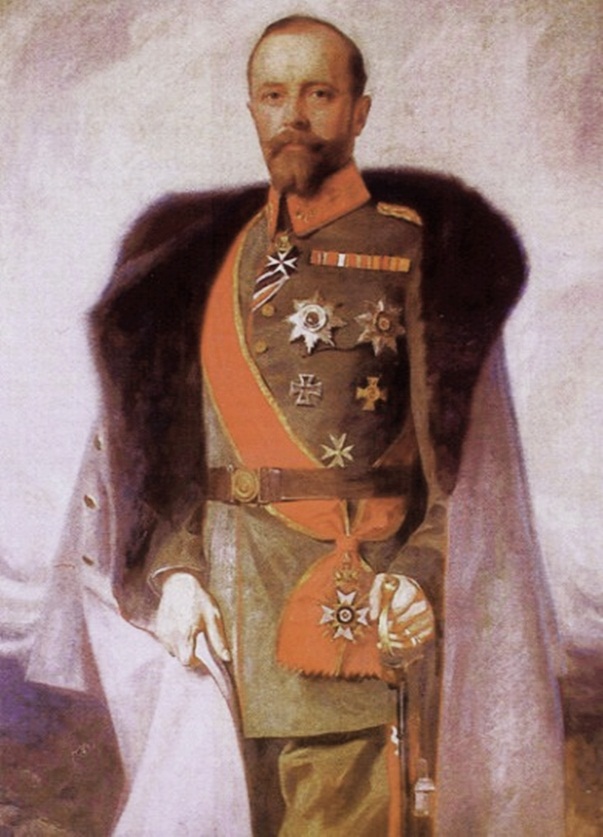|
Bernhart, Prince Of Sayn-Wittgenstein-Hohenstein
Bernhart Otto Peter, 6th Prince of Sayn-Wittgenstein-Hohenstein (born 15 November 1962) is a German businessman and the current head of the Princely House of Sayn-Wittgenstein-Hohenstein. Early life Prince Bernhart was born in Marburg the son of Christian-Heinrich, Prince of Sayn-Wittgenstein-Hohenstein (1908-1983) and his second wife, Princess Dagmar of Sayn-Wittgenstein-Hohenstein (1919–2003). Personal life Prince Bernhart was married at Castle Schwarzenau, Germany on 31 August 1996 to Countess Katharina von Podewils-Dürniz, the daughter of the German diplomat Count Max von Podewils-Dürniz (1919-1982) and his wife Baroness Elisabeth von Hirschberg (1927-1974). She has a doctorate in Art History and in 2003 was appointed Sotheby's representative in Hamburg. The couple have one child, Wenzel Max, Hereditary Prince (''Erbprinz'') of Sayn-Wittgenstein-Hohenstein (b. 1997). Career Prince Bernhart is Chairman of the Board of the ''Fürst Wittgenstein`sche Waldbesitzergesellsc ... [...More Info...] [...Related Items...] OR: [Wikipedia] [Google] [Baidu] |
Sayn-Wittgenstein-Hohenstein
Sayn-Wittgenstein-Hohenstein was a county and later principality between Hesse-Darmstadt and Westphalia. History The county with imperial immediacy was formed by the 1657 partition of Sayn-Wittgenstein-Wittgenstein and raised from a county to a principality of the Holy Roman Empire in 1801. It belonged from 1806 to 1815 to the Grand Duchy of Hesse and after 1816 to Prussia. The capital was Laasphe. The family line belongs to the house of Sayn-Wittgenstein-Berleburg. Current Prince of Sayn-Wittgenstein-Hohenstein The current head of this branch of the House of Sayn is Bernhart, 6th Prince zu Sayn-Wittgenstein-Hohenstein. He is the son of Christian Heinrich, 5th Prince zu Sayn-Wittgenstein-Hohenstein (1908-1983) and of Princess Dagmar zu Sayn-Wittgenstein-Hohenstein (1919-2002) Succession to the Hohenstein secundogeniture Four dynastic branches of the House of Sayn were extant at the beginning of the 20th century, each possessing its own secundogeniture.''Genealogisches Han ... [...More Info...] [...Related Items...] OR: [Wikipedia] [Google] [Baidu] |
Justus Perthes
Johann Georg Justus Perthes (11 September 1749, Rudolstadt, Schwarzburg-Rudolstadt – 2 May 1816, Gotha, Saxe-Gotha-Altenburg) was a German publisher and founder of the publishing house that bears his name. Life He was born in the Thuringian town of Rudolstadt, the son of a Schwarzburg court physician. From 1778 he worked as a bookseller in nearby Gotha, where he founded the cartographic publishing firm ''Justus Perthes Geographische Anstalt Gotha'' in 1785. In this, he was joined in 1814 by his son Wilhelm Perthes (1793–1853), who had been in the publishing house of Justus's nephew Friedrich Christoph Perthes at Hamburg. On Justus' death in Gotha, Wilhelm took over the firm and laid the foundation of the geographical branch of the business for which it is chiefly famous, by the first publishing of the '' Hand-Atlas'' from 1817–1823 after Adolf Stieler (1775–1836). Wilhelm Perthes engaged the collaboration of the most eminent German geographers of the tim ... [...More Info...] [...Related Items...] OR: [Wikipedia] [Google] [Baidu] |
Prince Gustav Of Sayn-Wittgenstein-Berleburg
A prince is a male ruler (ranked below a king, grand prince, and grand duke) or a male member of a monarch's or former monarch's family. ''Prince'' is also a title of nobility (often highest), often hereditary, in some European states. The female equivalent is a princess. The English word derives, via the French word ''prince'', from the Latin noun , from (first) and (head), meaning "the first, foremost, the chief, most distinguished, noble ruler, prince". Historical background The Latin word (older Latin *prīsmo-kaps, literally "the one who takes the first lace/position), became the usual title of the informal leader of the Roman senate some centuries before the transition to empire, the ''princeps senatus''. Emperor Augustus established the formal position of monarch on the basis of principate, not dominion. He also tasked his grandsons as summer rulers of the city when most of the government were on holiday in the country or attending religious rituals, and, ... [...More Info...] [...Related Items...] OR: [Wikipedia] [Google] [Baidu] |
Princess Madeleine Of Löwenstein-Wertheim-Freudenberg
Princess is a regal rank and the feminine equivalent of prince (from Latin '' princeps'', meaning principal citizen). Most often, the term has been used for the consort of a prince, or for the daughter of a king or prince. Princess as a substantive title Some princesses are reigning monarchs of principalities. There have been fewer instances of reigning princesses than reigning princes, as most principalities excluded women from inheriting the throne. Examples of princesses regnant have included Constance of Antioch, princess regnant of Antioch Antioch on the Orontes (; grc-gre, Ἀντιόχεια ἡ ἐπὶ Ὀρόντου, ''Antiókheia hē epì Oróntou'', Learned ; also Syrian Antioch) grc-koi, Ἀντιόχεια ἡ ἐπὶ Ὀρόντου; or Ἀντιόχεια ἡ ἐπ� ... in the 12th century. Since the President of France, an office for which women are eligible, is ''ex-officio'' a Co-Prince of Andorra, then Andorra could theoretically be jointly ruled ... [...More Info...] [...Related Items...] OR: [Wikipedia] [Google] [Baidu] |
House Law
House law or House laws (''Hausgesetze'') are rules that govern a royal family or dynasty in matters of eligibility for succession to a throne, membership in a dynasty, exercise of a regency, or entitlement to dynastic rank, titles and styles. Prevalent in European monarchies during the nineteenth century, few countries have house laws any longer, so that they are, as a category of law, of more historical than current significance. If applied today, house laws are mostly upheld by members of royal and princely families as a matter of tradition. Some dynasties have codified house laws, which then form a distinct section of the laws of the realm, e.g., Monaco, Japan, Liechtenstein and, formerly, most of Germany's monarchies, as well as Austria and Russia. Other monarchies had few laws regulating royal life. In still others, whatever laws existed were not gathered in any particular section of the nation's laws. In Germany where many dynasties reigned as more or less independent sov ... [...More Info...] [...Related Items...] OR: [Wikipedia] [Google] [Baidu] |
Leopold IV, Prince Of Lippe
Leopold IV, Prince of Lippe (''Leopold Julius Bernhard Adalbert Otto Karl Gustav''; 30 May 1871 – 30 December 1949) was the final sovereign of the Principality of Lippe. Succeeding to the throne in 1905 he had been governing the state since 1904 as regent. Early life He was born as Count Leopold of Lippe-Biesterfeld in Oberkassel, the son of Ernest, Count of Lippe-Biesterfeld and Countess Karoline of Wartensleben. Leopold belonged to the Lippe-Biesterfeld line of the House of Lippe which was the most senior line of the princely house after the reigning Lippe-Detmold line. He served as an officer in the German Army until 1894, when he left to study political science at the universities of Bonn and Berlin. Ruler of Lippe Since 1895, Lippe had been ruled by a regent due to the incapacity of Prince Alexander. Leopold's father had acted as regent since 1897, and following his death on 26 September 1904, Leopold assumed the regency. This was not recognized by the German Emp ... [...More Info...] [...Related Items...] OR: [Wikipedia] [Google] [Baidu] |
House Of Bismarck
The House of Bismarck is a German noble family that rose to prominence in the 19th century, largely through the achievements of the statesman Otto von Bismarck. He was granted a hereditary comital title in 1865, the hereditary title of Prince of Bismarck in 1871, and the non-hereditary title of Duke of Lauenburg in 1890. Several of Otto von Bismarck's descendants, notably his elder son Herbert, Prince of Bismarck, were also politicians. History The family has its roots in the Altmark region, descending from Herebord von Bismarck (d. 1280), the first verifiable holder of the name, mentioned about 1270 as an official (''Schultheiß'') at the city of Stendal in the Margraviate of Brandenburg. His descent from the nearby small town of Bismark is conceivable though not ascertained. Herebord was head of the Dressmakers' Guild. During the following two generations, the family seems to have gained knightly status. Herebord's great-grandson, Nicolaus (Klaus) von Bismarck, mentioned i ... [...More Info...] [...Related Items...] OR: [Wikipedia] [Google] [Baidu] |
Graf
(feminine: ) is a historical title of the German nobility, usually translated as "count". Considered to be intermediate among noble ranks, the title is often treated as equivalent to the British title of "earl" (whose female version is "countess"). The German nobility was gradually divided into high and low nobility. The high nobility included those counts who ruled immediate imperial territories of "princely size and importance" for which they had a seat and vote in the Imperial Diet. Etymology and origin The word derives from gmh, grave, italics=yes, which is usually derived from la, graphio, italics=yes. is in turn thought to come from the Byzantine title , which ultimately derives from the Greek verb () 'to write'. Other explanations have been put forward, however; Jacob and Wilhelm Grimm, while still noting the potential of a Greek derivation, suggested a connection to got, gagrêfts, italics=yes, meaning 'decision, decree'. However, the Grimms preferred a soluti ... [...More Info...] [...Related Items...] OR: [Wikipedia] [Google] [Baidu] |
Gustav Albrecht, 5th Prince Of Sayn-Wittgenstein-Berleburg
Gustav, Gustaf or Gustave may refer to: *Gustav (name), a male given name of Old Swedish origin Art, entertainment, and media * ''Primeval'' (film), a 2007 American horror film * ''Gustav'' (film series), a Hungarian series of animated short cartoons * Gustav (''Zoids''), a transportation mecha in the ''Zoids'' fictional universe *Gustav, a character in '' Sesamstraße'' *Monsieur Gustav H., a leading character in ''The Grand Budapest Hotel'' Weapons *Carl Gustav recoilless rifle, dubbed "the Gustav" by US soldiers * Schwerer Gustav, 800-mm German siege cannon used during World War II Other uses * Gustav (pigeon), a pigeon of the RAF pigeon service in WWII * Gustave (crocodile), a large male Nile crocodile in Burundi *Gustave, South Dakota *Hurricane Gustav (other), a name used for several tropical cyclones and storms *Gustav, a streetwear clothing brand See also *Gustav of Sweden (other) *Gustav Adolf (other) *Gustave Eiffel (other) * * *Gust ... [...More Info...] [...Related Items...] OR: [Wikipedia] [Google] [Baidu] |
Richard, 4th Prince Of Sayn-Wittgenstein-Berleburg
Richard, 4th Prince of Sayn-Wittgenstein-Berleburg (german: Richard zu Sayn-Wittgenstein-Berleburg, 27 May 1882 – 25 April 1925) was Prince of Sayn-Wittgenstein-Berleburg from 1904 to 1918. Life Prince Richard was born on 27 May 1882 at Berleburg, Germany. On 21 November 1902, at Langenzell, he married Princess Madeleine of Löwenstein-Wertheim-Freudenberg, daughter of Prince Alfred of Löwenstein-Wertheim-Freudenberg and Countess Pauline von Reichenbach-Lessonitz. His title was de-recognized by the Weimar and other German Republics after abolition of the German Empire in 1918 but lawfully retained henceforth as a surname. He died as the result of a traffic accident in Hanau on 25 April 1925 at age 42. Issue *Gustav Albrecht, 5th Prince of Sayn-Wittgenstein-Berleburg, b. 28 Feb 1907, d. 1944 (declared dead in 1969 after being missing in action in Russia, 1944) * Christian Heinrich, 6th Prince of Sayn-Wittgenstein-Hohenstein Sayn-Wittgenstein- ... [...More Info...] [...Related Items...] OR: [Wikipedia] [Google] [Baidu] |





.jpg)